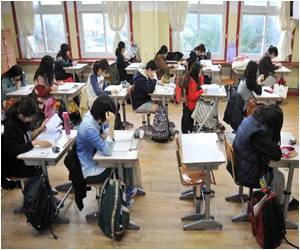A team of prevention scientists at Arizona State University demonstrates that a family-focused intervention program for middle-school Mexican American children leads to fewer drop-out rates and lower rates of alcohol and illegal drug use.

High-school aged youth that participated in the Bridges to High School program when they were in seventh grade were more likely to value school and believe it was important for their future. They reported lower rates of substance use, internalizing symptoms such as depression, and school drop-out rates compared to adolescents in a control group, according to the study, "School Engagement Mediates Long-Term Prevention Effects for Mexican American Adolescents," published in Prevention Science.
This research is especially significant since Mexican American youth face significant barriers that lead them to have one of the highest high-school drop-out rates in the nation. The program engages families in seventh grade to stay on an academic track and plan for their future so they are prepared for high school and young adulthood. The new findings show that adolescents who are at high risk for problems such as early drinking were most likely to benefit from the program and show positive effects.
Effects of the intervention program that included 516 students and their parents in four Maricopa County (Ariz.) middle-schools were found during the high-school years for participants who completed the program.
"The program has something to offer for all students, but our research shows those who need the program the most benefit the most," Gonzales said.
Key elements consist of students working with peers and facilitators to explore the value of education, identify and affirm personal goals and values, and learn strategies to cope with adolescent problems and difficult life challenges.
Advertisement
Ema Jauregui realized many benefits in her students when the program was implemented in her classroom when she was a middle-school teacher at Estrella Middle School in Phoenix.
Advertisement
Jauregui saw parents and children develop positive communication skills, even witnessing the first time a child and parent had hugged during the youth's teenage years.
Among the program's aims are to strengthen core competencies that allow youth to thrive, even when they are faced with adversity.
"Research findings support an assumption of the Bridges program that middle school is an opportune time to strengthen competencies and to motivate parents to provide the guidance and support that youth need to stay on a good path through adolescence," said Gonzales, the principal investigator for the study. Contributors include Associate Professor Larry Dumka, of the ASU T. Denny Sanford School of Social and Family Dynamics; Professor Roger Millsap, ASU Assistant Research Professor Anne Mauricio, and graduate student Jessie Wong of the ASU Psychology Department and REACH Institute (formerly the Prevention Research Center) in the College of Liberal Arts and Sciences; and Postdoctoral Fellow Russell Toomey, assistant professor at Kent State University.
The Bridges to High School research team has recently been awarded a new grant from the National Institute of Drug Abuse to focus on long term sustainability of the program in Title 1 schools.
"Now that we understand the core components that account for long-term effects of the program, we can redesign a next generation program that fits the needs of families and schools that have limited resources," Gonzales said. "We want to ensure that more families have this opportunity."
Source-Eurekalert









